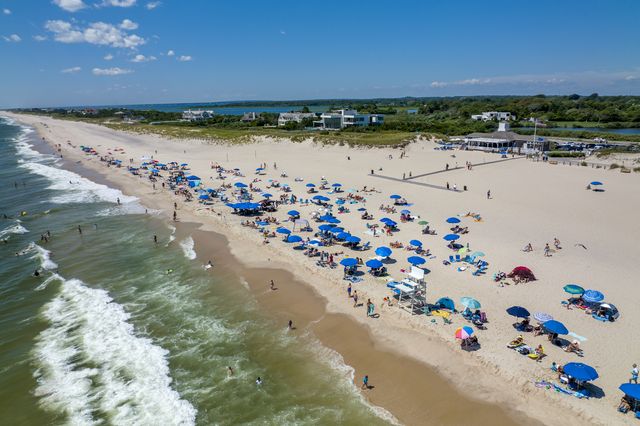Beneath the din of Southampton’s white-tent parties and commuter helicopters, a battle for beach access is heating up in one of the East End’s most exclusive enclaves.
Citizens of the Shinnecock Indian Nation say they are being denied their rightful access to Coopers Beach, accusing the local government of gatekeeping a pristine shoreline that the coastal tribe has navigated for thousands of years.
For the homeowners and renters of Southampton Village, parking at the beach is free. But the Shinnecock’s 1,600 citizens — roughly half of whom live roughly a mile inland, just beyond the village’s borders — must pay for the privilege to drive to the beach. A nonresident parking pass runs $50 for the day or $500 for the season.
Earlier this summer, a group of tribal leaders began pushing for their own beach passes – organizing letter-writing drives, social media campaigns, and a seaside protest last month. They cited similar initiatives approved by officials on Cape Cod and Rhode Island that offer free beach passes to those with tribal affiliation.

Southampton Village Mayor Jesse Warren initially agreed to strike a deal with the tribe, but the proposal was quickly shot down by the local board of trustees.
The resulting stalemate has escalated a long-simmering land-use debate in the region, pitting some of Long Island’s wealthiest summer residents against the descendants of its original inhabitants, who have lived on the land for thousands of years.
“There’s this resistance from the village to have minorities at that beach,” said Tela Troge, a tribal attorney leading the latest campaign for beach access. “How else do you justify charging us $500 to go to our ancestral beach?”
While Warren disputes that allegation, he has acknowledged that the process has taken longer than he hoped: “One person is not going to solve relations that have been built up over centuries.”
The original ‘Gold Coast’
Regularly cited as the world’s most expensive strip of real estate, Meadow Lane is a five-mile spit of the Atlantic shore that juts out from downtown Southampton. It is lined with mega-mansions that frequently fetch more than $50 million.

Coopers Beach sits at the doorstep to Meadow Lane. Its white quartz sand and immense width have earned it the distinction of the best beach in the country.
Maintaining that status isn’t cheap, local leaders say. And the fiscal pressures – daily raking and combing, concession overhead, and trash removal – have only intensified as more New Yorkers have flocked to the Hamptons in recent years.
Some residents have cited those financial realities in their concerns about passing out beach cards to the Shinnecock, according to Roy Stevenson, a village board member and owner of the local toy store.
“It’s regarded as one of the top beaches in the country and we intend to keep it that way,” said Stevenson. “If you are a taxpayer, one of the reasons you pay a tax in the village may be to have access to the beach.”
There are definitely stakeholders in the village who feel like [the Shinnecock] should continue to pay because they are not residents Roy Stevenson, a village board member and owner of the local toy store.
“There are definitely stakeholders in the village who feel like [the Shinnecock] should continue to pay because they are not residents,” he added.
He said the town was in the process of studying whether the free beach passes would have a measurable impact on parking availability and had already granted some concessions to the tribe. Currently, those with Shinnecock identification can purchase a $500 seasonal pass at half price. A limited number of daily parking passes are also available for tribal members, though advocates say they fall far short of the need.

Bryan Polite, the chairman of the Shinnecock Indian Nation, said the tribal members weren’t seeking a handout, but recognition of the original deed, agreed to by Long Island’s earliest white settlers, that guaranteed the Shinnecock permanent access to its waters.
“We were supposed to have unencumbered access to the ocean, but they’re putting up barriers,” Polite said. “For us to be denied the same rights as village residents, when that’s our aboriginal land, is a slap in the face.”
The official seal of Southampton Village, Polite notes, offers a visual reminder of the promise that accompanied the 1640 incorporation: it depicts a Shinnecock man facing a Pilgrim; a ship in the distance, as the ocean laps at their feet.
A question of public trust
Beachgoers’ rights rest on a legal principle known as the public trust doctrine – the common law concept dating back to ancient Rome that says the seashore should be preserved for everyone. But the breadth of those protections varies widely across states.
In New Jersey, a 1972 court ruling banned municipalities from charging higher beach access fees to nonresidents, likening the practice to discrimination. But local governments in New York have wider discretion to set fees for their beaches, in part because of a lack of existing case law.
“In some cases, the public trust will say you need to treat everyone equally,” said Tony MacDonald, the director of the Urban Coast Institute at Monmouth University. “For some reason, no one said [the parking fee] is functionally limiting access to the beach.”
Until recently, Shinnecock leaders said, legal action wasn’t necessary. For years, an unspoken understanding allowed tribal citizens to park at the beach without fear of being ticketed. That began to change in the last decade, coinciding with a significant boom in Southampton’s affluence and population.
“As a kid, I always remembered it being accessible,” said Dyáni Brown, a Shinnecock resident, who recalled eating fresh-caught lobster on the beach with her father and grandfather. “Then one day it’s like, ‘Oh, you have to pay hundreds of dollars.’”
During her last visit, in 2014, Brown says she immediately received a parking ticket upon leaving her car at the beach. The experience pushed her to start her own beach access campaign, collecting more than 150 signatures from tribal citizens and residents. The Southampton Village trustees agreed to review the proposal in 2015, but eventually stopped responding to her emails, Brown said.
“There was no consultation with the nation, no attempt to work something out, no acknowledgement of who we are or our interaction with the community,” she added. “That’s what’s most disheartening.”
Two years later, Brown conducted a survey of tribal citizens, finding that a majority of Shinnecock citizens had started limiting their beach access to off-hours because of the parking enforcement.

Road barriers
Coopers Beach is far from the only contested battleground in the Shinnecock Nation. Tribal citizens have clashed with their neighbors on subjects ranging from eel-fishing rights to billboards to the proper handling of ancestral burial grounds.
More recently, a revived plan to build a casino on the tribal territory has prompted fierce opposition from Southampton residents, who argue that a gaming facility would worsen traffic and diminish the area’s charm.
Leaders of the nation, meanwhile, say the gaming facility is desperately needed for economic development in a territory where more than half the residents live below the federal poverty line.
But while their relationship with the village has long been uneasy, multiple Shinnecock residents said the struggle for beach access has united many of the tribal citizens across generations.
“It’s kind of indicative of what we face all the time: the government moves the goal posts, they renege on things that were etched into treaty law and they put up road barriers,” said Polite, the chairman.
“But the ocean is very important to the Shinnecock people,” he added. “We’re still the people of the stony shores.”




